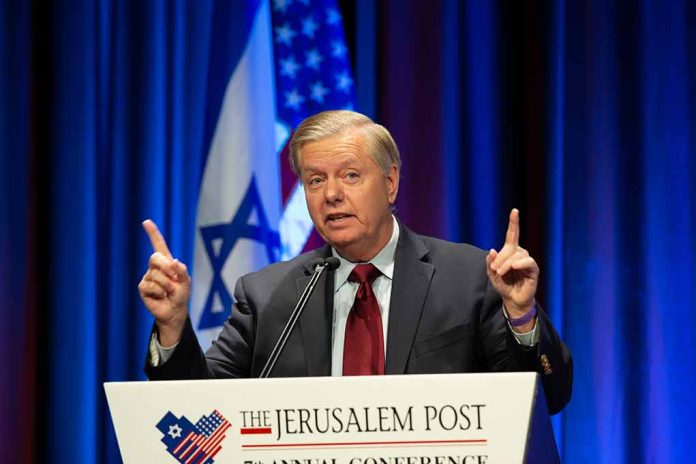
Argentine President Javier Milei boldly announced plans to move his nation’s embassy to Jerusalem by 2026, standing firmly with Israel while condemning global appeasement of terrorism in a powerful address to the Israeli Knesset.
Key Takeaways
- President Milei announced Argentina will relocate its embassy from near Tel Aviv to Jerusalem by 2026, following the path established by President Trump in 2018.
- Speaking before the Knesset, Milei condemned international appeasement of terrorism and criticized climate activist Greta Thunberg for her anti-Israel stance.
- Milei demanded the release of all hostages held in Gaza, including four Argentine citizens, while emphasizing Argentina’s unwavering support for Israel.
- Israeli Prime Minister Netanyahu praised Milei as a “true friend” of Israel, highlighting the strengthened diplomatic ties between the two nations.
- Knesset Speaker Amir Ohana noted Milei’s weekly studies with a rabbi have provided him with a moral compass guiding his strong support for Israel.
A Bold Embassy Move Affirms Argentine-Israeli Friendship
Argentinian President Javier Milei made a significant diplomatic announcement during his visit to Israel, committing to move Argentina’s embassy from its current location in Herzliya, near Tel Aviv, to Jerusalem by 2026. The announcement came during Milei’s address to the Israeli Knesset, where he delivered a powerful message of solidarity with Israel amid ongoing regional conflicts. This decision follows the precedent set by President Trump’s administration in 2018, which relocated the American embassy to Jerusalem in recognition of the city’s status as Israel’s capital – a move that has since been maintained despite international criticism.
Milei’s embassy relocation represents a significant diplomatic shift, as Jerusalem remains a contentious focal point in the Israeli-Palestinian conflict. Currently, only six countries maintain embassies in West Jerusalem, with most nations keeping their diplomatic missions in Tel Aviv to avoid taking a position on Jerusalem’s disputed status. By joining this select group, Argentina is making a clear statement about its alignment with Israel on the world stage, reinforcing historic ties between the two nations and positioning Milei’s administration as a steadfast ally in a region marked by complex geopolitical dynamics.
Argentina to move embassy to West Jerusalem next year, President Javier Milei says
https://t.co/QuClYKAV6t— The National (@TheNationalNews) June 11, 2025
Standing Against Terrorism and Global Appeasement
During his powerful Knesset address, Milei delivered a scathing critique of the international community’s response to terrorism against Israel. He condemned what he characterized as global manipulation by terrorist narratives, asserting that in a world increasingly dominated by moral relativism, Israel stands as a bastion of freedom and democracy worth defending. His speech emphasized the battle between good and evil, positioning Israel’s defense of its sovereignty as not merely a political issue but a moral imperative that Argentina fully supports.
“Argentina stands by you in these difficult days,” said Javier Milei, President of Argentina.
Milei specifically targeted climate activist Greta Thunberg, criticizing her stance on the Gaza conflict and her claims of being detained during protests. “[Thunberg] became a hired gun for a bit of media attention, claiming that she was kidnapped when there are really hostages in subhuman conditions in Gaza,” Milei stated forcefully. His comments highlighted his view that many global figures have mischaracterized the conflict while ignoring the plight of actual hostages, including four Argentine citizens currently held captive in Gaza, whose immediate release he demanded as part of his address.
Warm Reception from Israeli Leadership
Israeli Prime Minister Benjamin Netanyahu warmly welcomed Milei’s stance, praising him as a “true friend” of Israel who has demonstrated unwavering support during challenging times. Netanyahu emphasized the historical significance of Jerusalem to the Jewish people and nation, declaring that “the city of Jerusalem will never be divided again.” This sentiment directly aligns with Milei’s embassy relocation decision, which implicitly recognizes Israeli sovereignty over Jerusalem despite its contested status in international diplomacy and peace negotiations with Palestinians.
“The city of Jerusalem will never be divided again,” said Benjamin Netanyahu, Prime Minister of Israel.
Speaker of the Knesset Amir Ohana offered a unique insight into Milei’s steadfast support for Israel, noting the Argentine president’s weekly studies with a rabbi that have provided him with a strong moral compass. Ohana praised Milei as a passionate defender of Israel on the global stage, highlighting his stance against Iran and consistent advocacy for Israel’s security concerns. The warm reception from Israeli leadership underscores the deepening diplomatic ties between Argentina and Israel, with both nations finding common ground in their opposition to terrorism and shared democratic values.
Regional Implications and Global Context
Milei’s decision comes amid ongoing tensions in Gaza, where Israel faces international pressure over the humanitarian situation and high Palestinian casualty counts. By aligning firmly with Israel despite this global scrutiny, Argentina positions itself as part of a minority of nations willing to take concrete diplomatic steps supporting Israel’s territorial claims to Jerusalem. This stance places Argentina in contrast to many Western governments that have criticized Israel’s military operations while still maintaining political relations, and signals Milei’s willingness to break with diplomatic conventions in pursuit of what he views as moral clarity.
The embassy relocation announcement represents a continuation of Milei’s conservative, pro-Western foreign policy approach that has marked his presidency. By following in the footsteps of President Trump’s embassy move, Milei reinforces his alignment with strong conservative leadership and principles on the world stage. The decision also demonstrates Argentina’s independence in foreign policy matters, as Milei charts a course that prioritizes bilateral relationships based on shared values rather than conforming to multilateral consensus that often pressures nations to maintain diplomatic ambiguity on sensitive issues like Jerusalem’s status.







